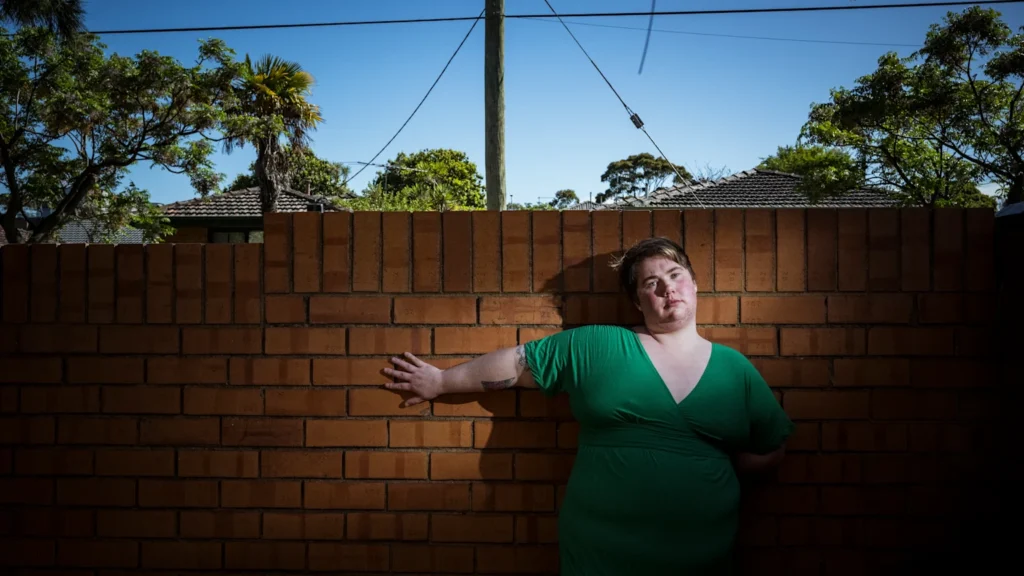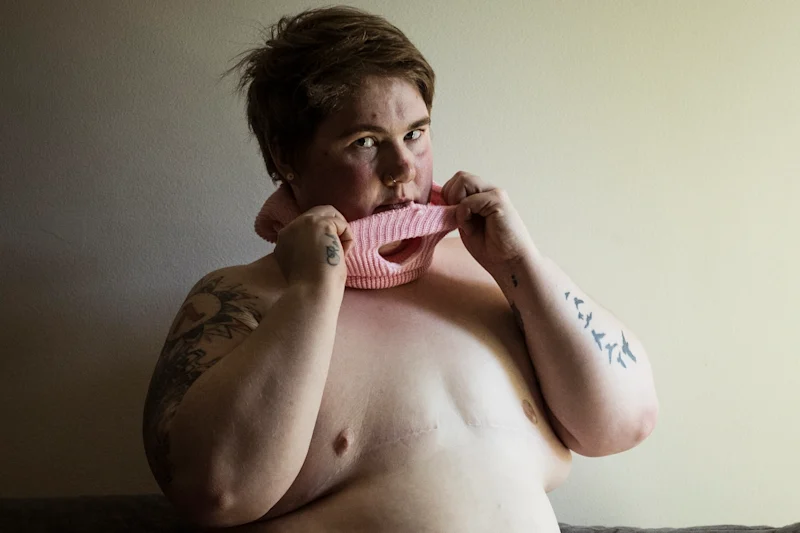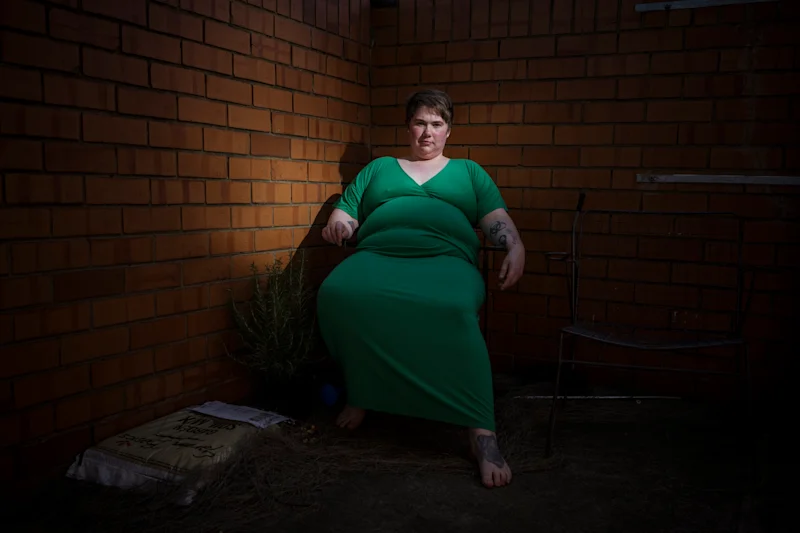A woman is suing the doctors who performed her gender treatment, claiming she could not have given informed consent.

A young woman who thought for years she was non-binary or a transgender man is suing two doctors and Monash Health for negligence, claiming gender treatment that included having both breasts surgically removed had caused her “significant injury”.
Mel Jefferies, a 33-year-old who was born as female and is now living again as a woman, has launched the civil lawsuit in the Victorian County Court.
One of the defendants in the case is Dr Jeff Willcox, a Melbourne GP with an “interest in gay men’s health, sexual health … and transgender health”. The others are Jaco Erasmus, a psychiatrist with a special interest in transgender health, and Victoria’s largest public health service, Monash Health.
Jefferies’ statement of claim, recently lodged with the court, accuses all three of falling short of delivering professional standards of care, including those outlined by the widely recognised World Professional Association for Transgender Health. The claim says those standards require doctors to ensure that “anyone experiencing mental health conditions must have these well-managed and thoroughly controlled prior to the commencement of the testosterone treatment”.

Jefferies says her years of mental health issues were not under control at the time of her treatment and were exacerbated by the testosterone prescribed by her doctors and surgery.
Her statement of claim says she has a permanently “deepened voice, hirsutism, clitoromegaly [a clitoris significantly larger than normal], vaginal pain/discomfort, abnormal body odour and acne, and pelvic floor dysfunction (as indicated by urinary incontinence).”
Under Australia’s current model of transgender treatment, known as “affirming care”, people’s gender identity is “affirmed and supported” when it conflicts with the gender they were assigned at birth.
“For years I just kept getting affirmed by the medical fraternity and the trans community for something I wasn’t,” Jefferies told this masthead.
“They kept telling me, ‘You’re non-binary, trans, maybe you’re non-binary’. I tried to pull away but they just kept pulling me back in … I never developed the discernment to say ‘this isn’t true’.”
Her case, filed by Slater and Gordon solicitor Anne Shortall, is one of the few brought in Australia by people who regret their gender treatment. Another is working its way through the courts in Sydney. Shortall declined to comment.
If Jefferies’ case proceeds to a judicial decision, it could represent a test case for the duty of care doctors owe towards people seeking affirming care. It comes as the number of young people seeking treatment for gender dysphoria has increased dramatically in the past decade.
It also comes as the transgender community and doctors who perform such treatments push for an “informed consent” model of care which would reduce the barriers to treatment, including the requirement for psychological assessments. They also want GPs to be able to treat gender issues as they do more common conditions.
Monash declined to comment as the case was before the courts and involved “confidential patient information”. Questions to Willcox were answered by his lawyer, who said he would defend the claim. Erasmus said he could not comment because the matter was before the court.
The claim outlines Jefferies’ interactions with doctors, starting in 2011, when Willcox first prescribed her testosterone. The Melbourne referral came despite letters from a psychologist and a doctor in Sydney that Jefferies was not ready for the treatment and should have more counselling, including for “social isolation and family dynamics of concern”, and support for her anxiety.
“By virtue of the results of the prior consultations, reasonable medical practice … required [Willcox] not commence the testosterone treatment until … the Plaintiff’s mental health difficulties were under control and her mental health stable,” the statement of claim alleges.
Instead, the document says, Willcox started the treatment “without consideration of the [earlier] recommendations”.
In two 2012 referral letters for gender and psychological treatment, outlined in the claim, Willcox acknowledged that Jefferies “has a complex mental health history” that included “body image disorder; eating disorder (adult); depression” as well as “suicidal ideation … disordered eating/body dysmorphia” and likely borderline personality disorder.
Some of the key symptoms of borderline personality disorder are impulsivity and instability in self-image and interpersonal relationships.
However, one of the letters written by Willcox said: “Despite the coexisting mental health issues, [Jefferies] has always appeared resolute in his desire to transition to the male sex and he feels surgery to remove his breasts is the next stage of this transition.”

The legal claim details strong swings in Jefferies’ attitude at the time. Between 2013 and 2017, it says, Jefferies stopped the testosterone treatment – she went on TV and described herself as a “detransitioner” – only to start it again two years later after another prescription from Willcox.
At one time she expressed a desire for a hysterectomy, then later said she was happier in her female biological sex. Later still she asked to have her breasts removed because they were “fat” and made her feel like “her skin doesn’t fit properly”.
Medical records referred to in the court documents suggest she wanted at times “to be asexual and have all of her reproductive organs removed”, then decided she was comfortable being gender-fluid.
Another doctor, who is not being sued, wrote in this period that Jefferies “does not move along the gender continuum but rather ricochets from one side to the other”.
The statement of claim also lists a catalogue of psychiatric medications Jefferies was prescribed, including anti-depressant, anti-psychotic and anti-anxiety drugs.
In 2017, a gender doctor, who is not named in court documents, referred Jefferies to Monash Health on a recommendation from Erasmus. The referral was to convince Monash Health to recommend Jefferies for public funding under Medicare to pay for the mastectomy.
A second letter from Erasmus to a plastic surgeon, Dr Andrew Ives, outlines Jefferies’ history of mental health issues but says they were “reasonably well controlled”.
Jefferies had “come to the conclusion that he has an unspecified gender identity and does not wish to be perceived as male or female”, the referral letter says.
“In a binary society though he would settle for being perceived as male and therefore prefers using male pronouns … In my opinion Mason [the name Jefferies was then known by] has experienced persistent gender dysphoria … he is able to make an informed decision and has the capacity to consent to treatment,” the Erasmus letter says.
Jefferies, who was on the consumer advisory panel for the Monash Gender Clinic for a time, now says she should not have been referred for the double mastectomy. Her mental health was “unstable and not well controlled”, according to the claim.
In October 2017, Ives – billed on website Transsurgery Australia as “one of the country’s leading Transgender Surgery experts” – removed Jefferies’ breasts. Ives is not a defendant in the lawsuit and also declined to comment while the matter was before the courts.
Jefferies claims the treatment exacerbated her self-harm, increased her suicidal thoughts, helped prompt drug overdoses and “the need for repeated psychiatric hospitalisations”. She now has complex and chronic post-traumatic stress disorder, is in partial remission from “alcohol misuse disorder”, and has suffered “irreversible and serious injury to her physical body”, the court documents allege.
This masthead does not suggest the defendants are necessarily liable. The case is ongoing and the defendants are expected to file a defence next month.
Jefferies is seeking general damages and the cost of mental and physical health treatment.
Asked if she bore any responsibility for her insistence, at times, on treatment, Jefferies told this masthead: “I didn’t have the capacity to give consent – most of the time I was in transition I was going through crisis after crisis.”
She claimed that she had been influenced by a common belief in the trans community that their families and society would reject them, and if they could not transition, they would suicide.
“I didn’t have the ability to think long term. I was warped by the thinking that if I didn’t do this I was going to die,” Jefferies said. “They [the trans community] are in the grips of fear, and an us-versus-them culture. They tell you ‘They hate you, you’re only safe with us’. It’s an intense pressure.”
The issue of detransition is controversial in the transgender community. Some say the media over-emphasises stories of detransitioners – stories they say are then co-opted by conservative voices to amplify their argument that transgender medicine has gone too far. Some research insists people who regret their treatment are a tiny proportion, about 1 per cent, of those who undergo it. This figure is disputed by others.
Lawsuits have been brought and settled in the past over similar issues. A claim in 2003 against the Monash Gender Dysphoria Clinic was settled, but prompted a review by the chief psychiatrist. That found the clinic’s psychiatrists were not rigorous enough in applying diagnostic criteria.
Another legal claim made public in 2009 – two years before Jefferies started treatment – prompted the Monash clinic to close for three months and the forced resignation of its director. Another review followed, which found the clinic needed “better responses to meet the mental health needs of clients”.
Jefferies has requested a judge-only trial, two of the defendants want a jury.
Source: The Age
or
